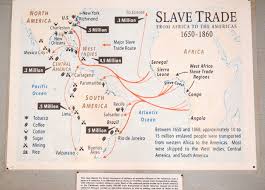11 June 2020
The Slave Trade
Not my fault.
By John Watson
 It may have been too much cheese, but I had nightmares last night and the worst of those nightmares was that I was a direct descendant of Genghis Khan. Now the Great Khan had many talents but by modern standards he behaved pretty badly. Murder on a huge scale, genocide, rape, polygamy, enslaving people, looting, he engaged in a cornucopia of activities which would have made him unsuitable for membership of, say, the Islington branch of the Liberal Democrat party. Alarmingly, he also had lots and lots of children so that he now has lots and lots of descendants. Could my dream possibly be true?
It may have been too much cheese, but I had nightmares last night and the worst of those nightmares was that I was a direct descendant of Genghis Khan. Now the Great Khan had many talents but by modern standards he behaved pretty badly. Murder on a huge scale, genocide, rape, polygamy, enslaving people, looting, he engaged in a cornucopia of activities which would have made him unsuitable for membership of, say, the Islington branch of the Liberal Democrat party. Alarmingly, he also had lots and lots of children so that he now has lots and lots of descendants. Could my dream possibly be true?
The Coronavirus has got us used to exponential functions but they can also be used in other contexts and the calculation of one’s pool of ancestors is one of them. Every generation you go back doubles the potential size of the pool. For example, you have two parents, could have four grandparents, could have eight great-grandparents et cetera and, if you are baffled by that word “could”, go down to the Forest of Dean and look around you. If, then, we assume a new generation every 25 years, a century will take you back through four generations and give someone aged 25 today a potential pool of breeding-aged ancestors of 16 in 1920. Go back two centuries and it becomes 256; four centuries, 65,536 and eight centuries 4,294,967,296. Now Ghengis was up and going around 800 years ago when the world population was 400 million, rather less than 10% of that figure. That is because of overlaps of course. On average, each 13th century ancestor must hold that status by over 10 different routes. Still, it must be a racing certainty that one or more of my ancestral lines runs back to that mass murdering, mass raping, genocidal, enslaving, looting, swine Genghis. The question is, what on earth should I do about it?
One possibility is to make good by apologising for his misdeeds. To seek out the descendants of those who he raped and enslaved, the children of those who escaped from his genocides or the heirs to the property which he grabbed, and apologise to them. That is the politically fashionable way to behave, but there are practical difficulties. How does one identify them? Would an advertisement in the newspaper suffice? Then there are all the other thugs of the ancient world from who I am also descended, Nero, Bluebeard, Vlad the Impaler, and lots and lots more. Cripes, this is beginning to look rather expensive. Then there is another problem. I may be descended from one of Genghis’s victims as well as from him. Should I apologise to myself and, if so, is there some special form of words for it?
As I puzzled over these difficult issues I turned on the television and there in front of me was an American academic talking about the slave trade and making the point that the British were responsible for it as well as the Americans. Well that is certainly the case and I don’t think there’s much of a secret about it, but his implication was that in some sense we should be shouldering guilt and blame for the fact and that is where I completely disagree with him. I am no more responsible for the sins of slave trading ancestors than I am for the depredations of Genghis.
The teaching of history is important in many ways. It passes on the experience of past generations which, hopefully, prevents us from making their mistakes again. It helps us to understand things about ourselves which give valuable clues to our make-up. If, to borrow Pope’s words, “The proper study of mankind is Man”, you need to know something of the history of man to carry out that study. What history should not be, however, is a vehicle for “visiting the iniquity of the fathers upon the children unto the third and fourth generations” and we have no business to feel guilt for things for which we are not responsible. Yes, there may be moments when national leaders have to acknowledge and apologise for things which occurred in living memory but, apart from that, expressing guilt for things done by long dead generations is mawkish, fatuous and unpleasantly self-indulgent. “Oh I apologise for what my ancestors did in the 18th century” might sound like caring but the subtext is usually: “which shows what a splendid person I am in comparison to them”, or worse still “which crocodile tears absolve me from having to take any action to deal with today’s problem today.” Show me someone apologising for his ancestors and I will show you a hypocrite. We should just apologise for our own faults. God knows, we have enough of them.
Of course racial prejudice has its roots in slavery and the slave trade. Of course that should not be air-brushed from history. But in the end it does not really matter a damn. What is important is to find the practical steps necessary to rid the world of this incubus and then to have the courage and application to follow them through.


